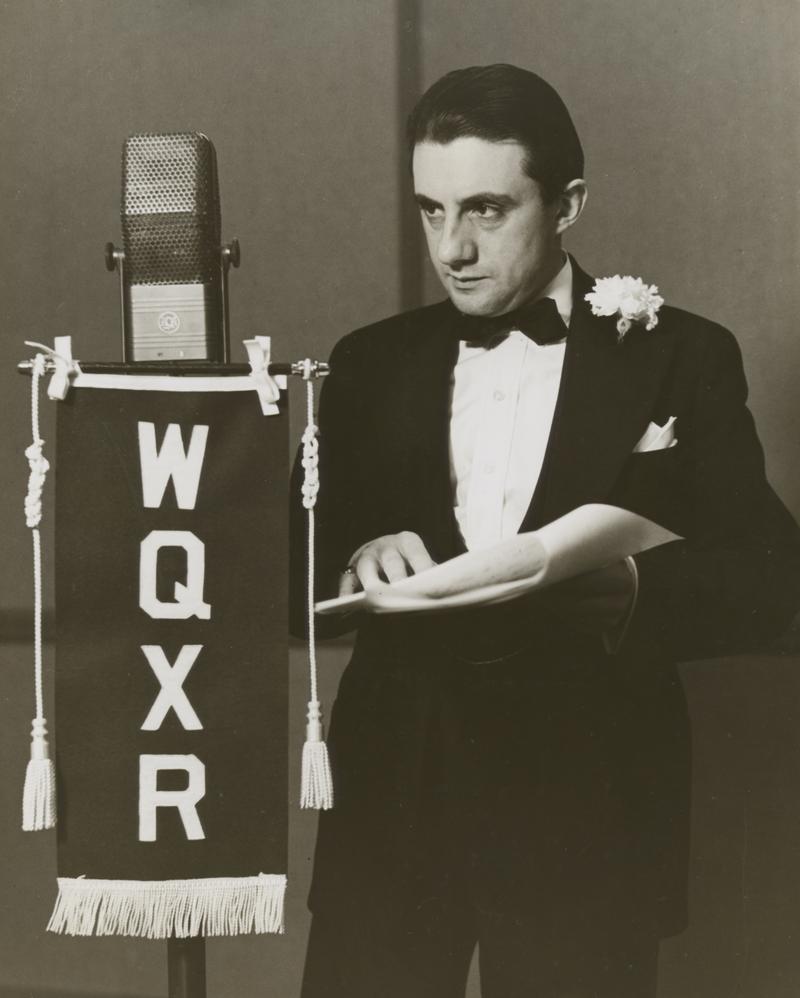 NYPR Archives & Preservation
NYPR Archives & Preservation
An Orchestral Conductor Looks at Radio

In 1941 John Barbirolli was the Conductor of The New York Philharmonic-Symphony Society Orchestra. In February of that year he wrote the following for the WQXR Program Guide.
I have two reasons, for being grateful to WQXR. The first I share with all readers of this booklet: I love good music and consequently am an enthusiast for this station which gives us good music more consistently than any other. I wish that WQXR were not the unique institution which it undoubtedly is. I wish that there were many such stations so that not only the New York public, but people all over the country could have a spot on the dial on which they could rely to give them music that is worthwhile.
Musicians are traditionally supposed to be incapable of dealing with the brutal facts on which businessmen base their decision. As a musician, then, I speak with due humility, but I imagine that many of you have shared an idea which has often occurred to me: when radio advertising is presented in conjunction with programs of good music, as it is on WQXR, I feel much more kindly disposed to the advertiser.
The second and more special reason for my interest in WQXR comes from the fact that I am a conductor. WQXR allows me to not only hear performances by other men but to take quiet stock of my own. Occasionally, I have turned on a program in the middle of a piece and listened for some minutes before realizing that the orchestra was directed by myself. To paraphrase Burns, I had the invaluable opportunity "to hear myself as others hear me."
A violinist friend of mine once said that he objected to the radio because he didn't like being turned on and off like a tap. I can sympathize with his feeling, but I think it is probably good for musicians to be as defenseless before the public as radio makes us. An attitude of conventional politeness and deference to the other fellow's opinion obtains inside the concert hall --particularly here and in England --which is perhaps a little too kind to the vanity of the performer. No considerations of politeness or embarrassment sway a man who is sitting alone with his radio. Only the music and the quality of the performance can hold him, and that is as it should be.
I have always had a particular regard for radio audiences. By the time I began to conduct, radio was already an accepted fact, so that the question of whether or not to establish a bowing acquaintance with this newcomer, which troubled so many conductors of an older generation, never was a problem for me.
I have always thought that the compilers of ordinary radio programs underestimated the public's intelligence. Since I have been associated with the Sunday afternoon broadcasts of the New York Philharmonic Symphony, the thousands of letters which have come to me from radio listeners everywhere have convinced me that that is true. Often these letters have given me valuable suggestions, the more valuable because they were offered in a spirit of frankness that would have been difficult had the writer known me personally or had we been talking face to face.
Radio has one advantage over the concert hall of which I wish it would make more use. That is in the matter of introducing new works. From long experience I know that the concert public does not often care to pay its money to hear compositions performed for the first time. In order to give contemporary composers a chance, those who arrange the programs for a major symphony orchestra must see to it that if a new work is included on the program, it is balanced by one so popular that there will not be too precipitous a falling-off in sales at the box office. But, no matter how cleverly this is done, the number of new works which an orchestra can perform each year is severely limited. A radio station such as WQXR gives more programs in a day than we do in several weeks at Carnegie Hall. The listeners haven't paid money for their seats. Perhaps most important of all, their attention is apt to be less strained than it is in the atmosphere of the concert hall. This means that a new work can ingratiate itself more easily. Audience fright is as real as stage fright and it is this which prevents many people from enjoying an unfamiliar work of music, particularly when it has been heralded as "modern" and "difficult."
It is next to impossible to prove such things but I am convinced that WQXR has been influential in broadening the taste and sharpening the critical acumen of New York's concert audiences. Although these constitute one of the most discerning musical publics in the world, it is still impossible, in a city which offers such an abundance of important concerts, to rely on the cognoscenti to fill your houses. The problem is to increase the number of these and at the same time to make inroads into that vast potential public which would like good music if it had a chance to hear it more often. WQXR helps to do just that.